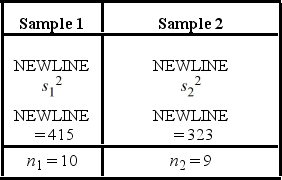Multiple Choice
The following are the competing hypotheses and the relevant summary statistics: Η0:  /
/  ≤ 1, ΗA:
≤ 1, ΗA:  /
/  > 1.
> 1.  The p-value associated with the value of the test statistic is 0.3692. At the 5% significance level, which of the following conclusions is correct?
The p-value associated with the value of the test statistic is 0.3692. At the 5% significance level, which of the following conclusions is correct?
A) We reject the null hypothesis and conclude the first variance is larger than the second.
B) We do not reject the null hypothesis and conclude the first variance is larger than the second.
C) We reject the null hypothesis and cannot conclude the first variance is larger than the second.
D) We do not reject the null hypothesis and cannot conclude the first variance is larger than the second.
Correct Answer:

Verified
Correct Answer:
Verified
Q80: Use the R function _ to obtain
Q81: Which of the following hypotheses is a
Q82: Consider the expected returns (in percent) from
Q83: Which of the following is used to
Q84: The value of the test statistic for
Q86: A researcher compares the returns for two
Q87: Annual growth rates for individual firms in
Q88: The following table shows the annual returns
Q89: Use the F table to approximate these
Q90: If a sample of size n is